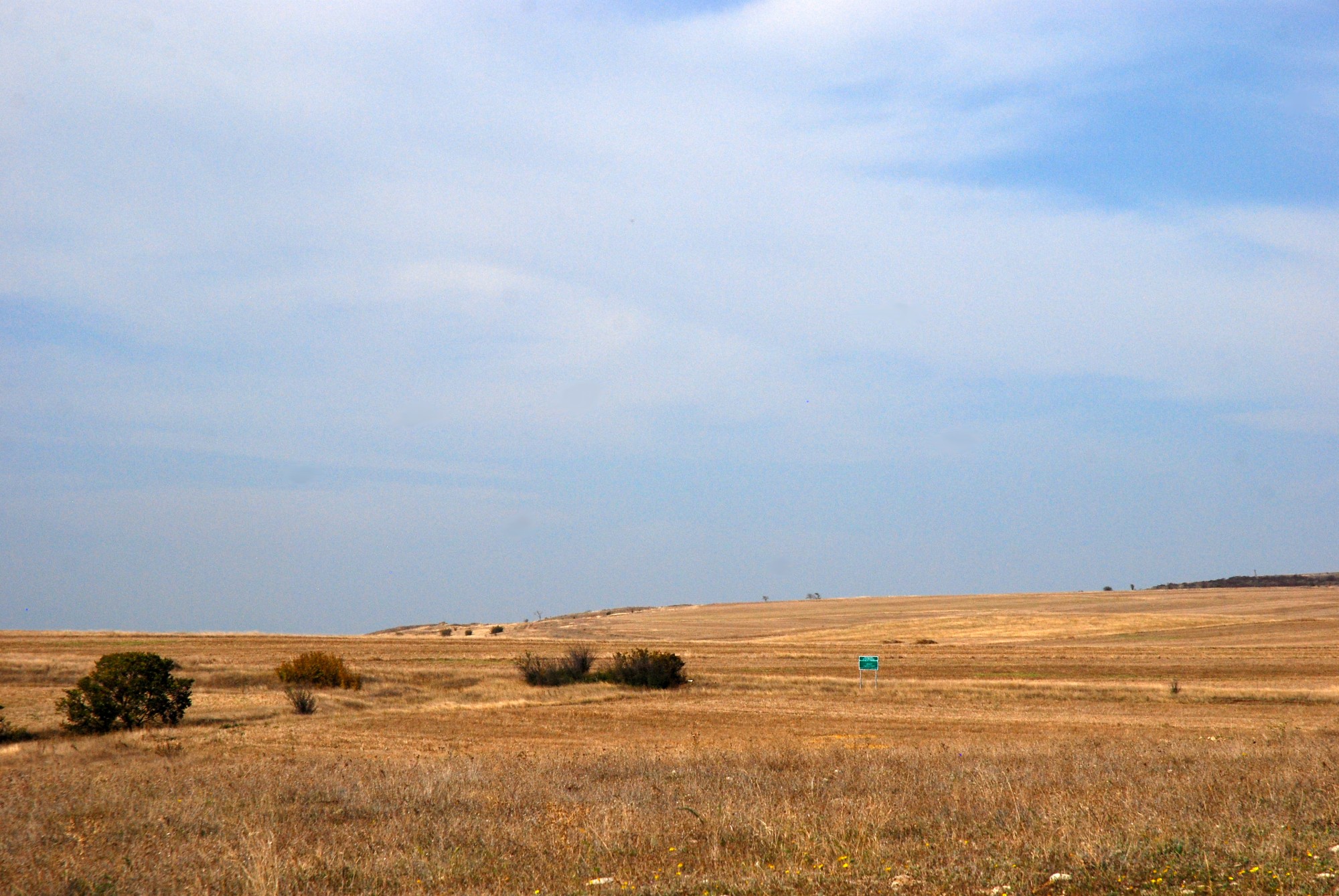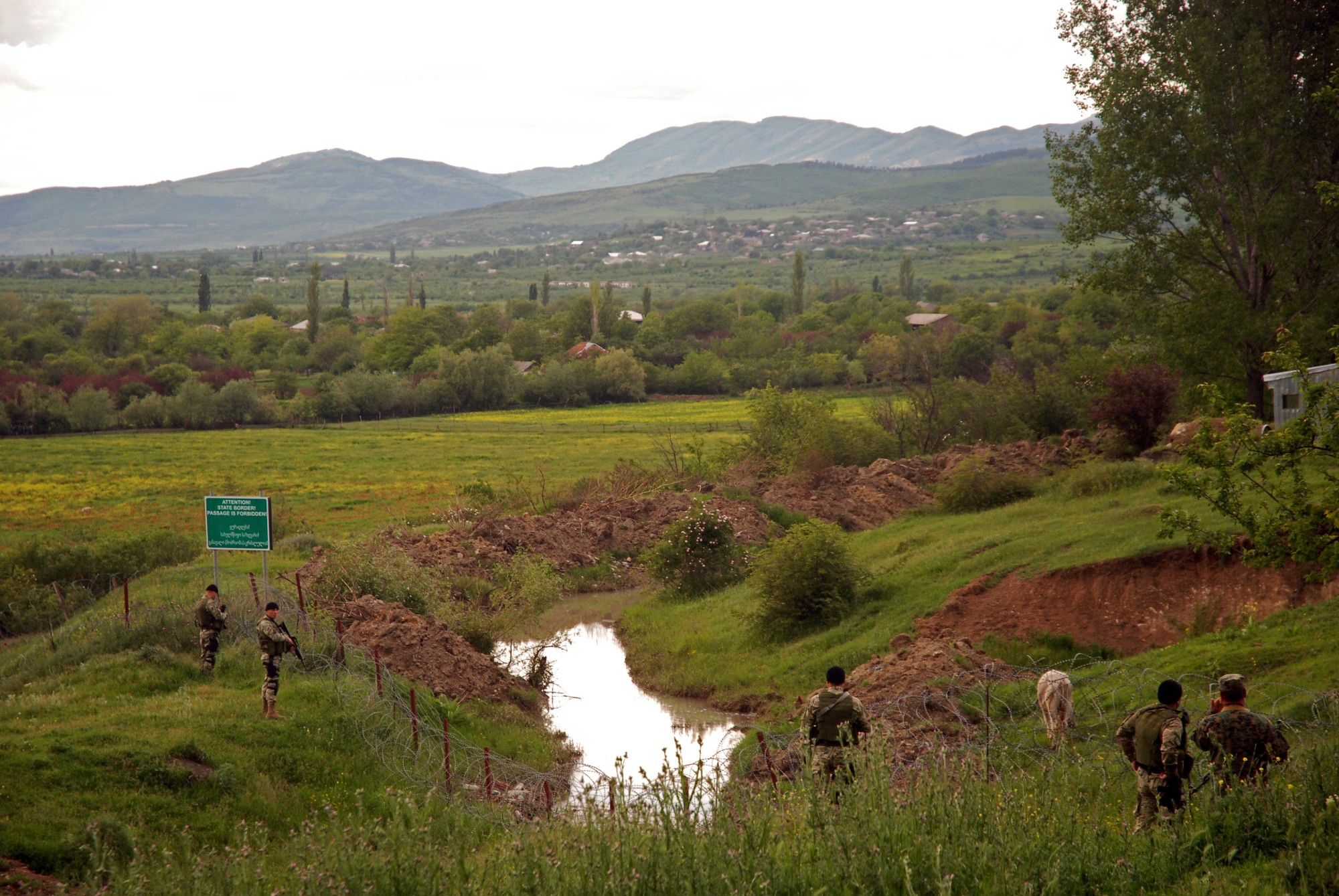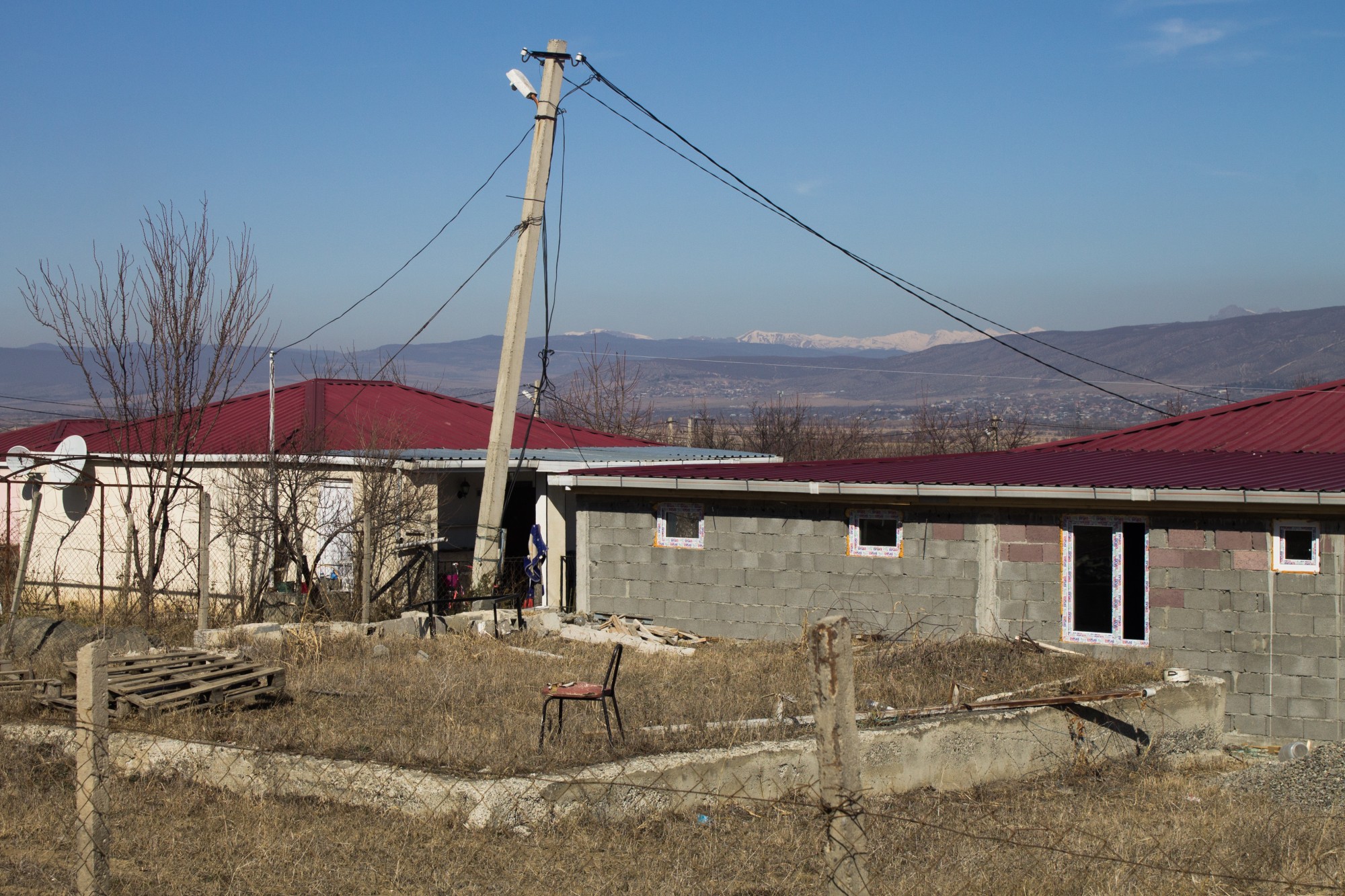Unrecognized Pandemic Politics
What does South Ossetia’s international behaviour during the coronavirus crisis teach us about de facto states?
What does South Ossetia’s international behaviour during the coronavirus crisis teach us about de facto states?

A 'border' sign in the middle of a field in South Ossetia, close to the Saribari village.
Jelger Groeneveld“The threat of coronavirus looms large in six self-declared republics that have broken away from post-Soviet states,” declared International Crisis Group (ICG) in early May. At the time there were a little over eight hundred confirmed COVID-19 cases in de facto Abkhazia, Nagorno-Karabakh, South Ossetia, Donetsk, Luhansk, and Transnistria. A month later, the total number stood around 2,386 (including recoveries and deaths), which, due to limited testing and controlled information flows, is a low estimate. Given the deep impact of past or current violent conflict, their small but elderly populations, their isolated economies, and the lack of quality medical infrastructure, the rim of post-Soviet de facto states is particularly vulnerable.
The isolation of de facto states can be a blessing and a curse: curbed movement of people and goods means fewer infections, but also fewer sources of outside help. But the post-Soviet de facto statelets are all different in terms of both internal and external dynamics. Comparing their pandemic responses reveals much about the politics of these unrecognized polities. Take Georgia’s breakaway territories, Abkhazia and South Ossetia. Both polities have closed regular crossing points with Tbilisi-controlled territory, but while a significant number of international organisations have a presence in Abkhazia, South Ossetia remains much more isolated (only the International Committee of the Red Cross (ICRC) has been allowed to operate). Similarly, Abkhazia has taken steps to cooperate with Tbilisi, allowing patients to be tested and treated in Georgian hospitals. South Ossetia has refused any international aid (more on this later) or cooperation with Tbilisi.
This directly relates to easily overlooked differences between the two post-conflict polities. They find themselves in similar geopolitical circumstances, but Abkhazia has more international connections (through its tourism as well as its sizable diaspora), a more deeply-rooted national movement, and a more pluralistic society with some elements resisting further integration with Russia and promoting internal democratisation as a way to gain legitimacy. South Ossetian independence, meanwhile, remains seen by many locals as an intermediate step, until integration into the Russian Federation becomes realistic. With movement across the border with Russia restricted, how does the coronavirus pandemic play out in this tiny de facto statelet most dependent on Russia?
Suspicious Ossetians?
At first, local authorities in Tskhinval/i, the South Ossetian capital, placed their bet on the advantages of isolation. Besides closing the de facto border with Tbilisi-controlled Georgia, little was done. A ban prohibiting foreigners from entering South Ossetia initially included an exception for Russians. Only towards the end of March, Russians, too, were barred from entering. Large-scale events were banned in mid-March, but this did not prevent the de facto president from attending the opening of a freestyle wrestling tournament.
Meanwhile, there are only 26 ventilators in Tskhinval/i, only a dozen doctors who know how to use them, and sheer shortages of personal protective equipment. In April, some more stringent measures were introduced, but, overall, life became a more careful version of “business as usual” in South Ossetia. Cafés and restaurants were closed for a few weeks, but have been allowed to reopen since 25 May, while the border with Russia will stay mostly sealed until the end of June.
Yet, 68 cases is in fact a burden on a de facto state of only 30-50,000 inhabitants, and a GDP per capita comparable to that of Cambodia. For now, most cases have been concentrated among health workers and youngsters returning from military schools in Russia. But if a second wave of infections hits, South Ossetia remains ill-prepared.
South Ossetian de facto officials stand before multiple dilemmas. The lax quarantine regime has not gone uncriticized. Some locals faulted the authorities for setting a bad example, so that many citizens did not take the threat of the pandemic seriously. Simultaneously, the authorities could not risk hurting the vulnerable economy much more. There is no budget to pay people’s bills and fund closed cafés for months. Economic crisis could provoke a backlash, especially if the seriousness of the threat is doubted. Suspicion against the virus manifested itself more prominently on the other side of the mountains. In North Ossetia’s capital Vladikavkaz, up to 2,000 people took to the streets on 20 April in an anti-self-isolation rally organized by conspiracy theorist and opera singer Vadim Chyeldiyev. Although people seem to have started taking COVID-19 more seriously in South Ossetia, a local journalist explained to me that the events in the North made the de facto authorities in the South wary of introducing stringent measures.
Underlining the Unrecognized Borderline
Existing problems tend to resurface in times of crisis. The ongoing pandemic has had this effect for the borderline (called the “administrative boundary line” by the international community) separating Tbilisi-controlled Georgia from breakaway South Ossetia. The line is an ill-determined one, patrolled by Russian security troops, and serves as a primary site for struggles over South Ossetia’s political status.

The ‘administrative boundary line’ at Khurvalleti, between Georgia and South Ossetia.
Jelger GroeneveldThe slow but steady transformation of the conflict line into a de facto border with fences, barbed wire and checkpoints aims to remind Georgia and its international allies, of so-called “new realities” on the ground. Materialisation of the borderline (this process is often called “borderisation”) has also occurred during the pandemic (during Orthodox Easter), and has demonstrated that Tbilisi and Tskhinval/i live in different worlds altogether. Tbilisi has construed the setting up of new “border” signs as deliberate provocations harming the security environment, and international mediators have stressed the need for cooperation in times of crisis. Tskhinval/i maintains that life goes on, and that border signs provide clarity as to where the borderline runs, so that locals can avoid unintentional but illegal crossings.
A second way in which the importance of the borderline has become visible recently, is through its inward function, undergirding the legitimacy of the South Ossetian elite and isolating its population. The borderline operates as a pair of political binoculars, through which Georgia is viewed; whatever crosses the line must be dangerous. Examples of this include the ways in which the Lugar Centre, a medical research lab in Tbilisi, is regarded as a biological threat, or how Georgian medicines sold in South Ossetian pharmacies are confiscated.
The importance of recognized borders to the South Ossetian “self” can go as far as to jeopardise the physical security of the polity itself. In this regard, scholars of International Relations would point to the sometimes overriding salience of “ontological security”. International political actors routinise their social relationships with “others” to sustain a stable sense of identity. For South Ossetia a sense of identity is invested in the de facto border, a marker of unilateral achievement in the face of the “Georgian threat”.
This may provide us a clue as to why South Ossetia has so far refused international assistance from the World Health Organisation (WHO), unless it would enter the territory through Russia instead of Georgia. According to the ICG report, Tskhinval/i elites fear “that cooperation with officials arriving from government-controlled Georgia would undermine their claim to independence.” Due to a lack of international contacts and experience, South Ossetia mistrusts anything coming through Georgia. This is in sharp contrast with de facto states like Transnistria and Abkhazia, which try to see contacts with international organisations as a step towards international legitimacy.
Cooperation on the extreme periphery
So far, perhaps the most fascinating headline about South Ossetia during the pandemic has been the following: “South Ossetia will receive humanitarian aid from the DPR”. At first glance it seems surrealistic that the Donetsk “People’s Republic” (DPR), one of the two Russia-backed, rebel-led proto-states in Eastern Ukraine, would send masks and medicines to South Ossetia. But we should take a closer look at such cooperation between unrecognized entities situated on what political theorist Mikhail Minakov calls the “extreme periphery” of the world-system. Minakov argues that the post-Soviet de facto states constitute a realm of their own, separate from ordinary peripheral places and at a qualitatively different scale of isolation and dependence. These statelets build their polities according to a model which opposes all the rules with which the centre organizes the world-system. We will see that the anecdote above fits with this new understanding.
Only months after the Ukrainian revolution of 2014, the previous de facto president of South Ossetia, Leonid Tibilov, officially recognized both the Donetsk and Luhansk “People’s Republics”, while Russia, by contrast, still does not recognizes the rebel areas as states. Over the past years, diplomatic relations between Donetsk, Luhansk, and Tskhinval/i have become routinised. For example, on 11 May 2020 de facto South Ossetian president Anatoly Bibilov sent “video congratulations” to Donetsk, celebrating the latter’s sixth anniversary of “existence”.
There are two dimensions to these strange relations. Let’s start with the symbolic dimension. Until “unification” with North Ossetia is possible at a point in the distant future, South Ossetia’s primary goal is to stay as separate as possible from Georgia. The whole state identity is built around repeated war and separation. South Ossetia’s worst nightmare would be the possibility of a deal being struck between Georgia and Russia. It takes a different strategy from Abkhazia. South Ossetia is smaller, more neglected, and more dominated by purely Russian interests, so cannot afford to cultivate the image of the more likeable and less illegitimate case among the de facto states. Instead, the South Ossetian elites choose to tie their fate closely to geopolitical competition between Russia and the West. They choose to be the “rogue guy” amongst the de facto states, avoiding at all costs the prospect of becoming a second Transnistria (which may slowly be moving towards de facto reintegration).
Hence, the ties with Donetsk. Support from the DPR reaffirms South Ossetia’s position in the Russian orbit (Russkii Mir). This strengthens South Ossetia’s ontological security, being recognized by other Russian-speaking revisionists. In addition, whether the aid from Donetsk is sufficient or not is beside the point, the function is to demonstrate solidarity among the de facto states on Russia’s fringe, to show their continued importance amidst global crisis, and to undermine Western attempts at “engagement without recognition”.

Tserovani, Georgia’s largest settlement for internally displaced persons from the Georgian-Ossetian conflict. In the distance, the Caucasus range separates South Ossetia and Tbilisi-controlled Georgia from Russia.
Thijs KorstenThe other side of the story is one of material interests. South Ossetia serves as a channel for illicit economic ties between Russia and Donetsk which bypass international sanctions. A holding company officially located in Tskhinval/i controls the twelve biggest industrial enterprises in the rebel-controlled parts of Donetsk and Luhansk, while the so-called “International Clearance Bank” is used to transfer money from Russia to the rebel proto-states.
Once again, South Ossetia positions itself as important to Russia. Power motives for Russia turn out to be closely compatible with symbolic motives (ontological security-seeking) on the part of South Ossetia’s elite. In the meantime, shadow companies set up in South Ossetia to trade with rebel-held eastern Ukraine pay hundreds of thousands of dollars in corporate income tax on their profits, a welcome source of revenue for the cash-strapped polity.
Non-recognition during a global crisis
Being a de facto state matters during a global health crisis. Although all post-Soviet de facto states are especially vulnerable due to their isolation from the international system, this isolation has also proved to be a temporary cushion for some. Variations in de facto states responses and willingness to cooperate internationally demonstrate once again that they are not all the same. South Ossetia, in particular, is a unique case, where the pandemic has brought to the surface once more the problem of unrecognized borders and ontological insecurities produced by non-recognition. In some situations, ontological security can indeed override the physical security of de facto states’ populations.
At the same time, the symbolic and material dimensions of de facto states’ security cannot be meaningfully separated, as the Donetsk anecdote has shown. On the one hand, mere identity politics would not be enough to explain why South Ossetia, in times of crisis, sustains humanitarian relations with a rebel-led proto-state. If it was only about fostering a shared identity among unrecognized polities in Russia’s orbit, we would see more coronavirus-related efforts coming from the “Commonwealth of Unrecognized States”, for example. But if the identity-links between Donetsk and South Ossetia did not matter, the narrative of cooperation would not resonate with South Ossetians as natural and positive, and thus would not serve local elites’ grip on power.
Overall, the ongoing pandemic shows how de facto states are not simply isolated from the world. Although operating on the world-system’s extreme periphery, they are part of global dynamics. Likewise, it’s as senseless to reduce the internal lives of de facto states to crude geopolitics, as it is to take power out of the equation altogether.
Thijs Korsten has worked as an intern for the Georgian Foundation for Strategic and International Studies (GFSIS), researching the Georgian-Ossetian conflict, and is an incoming graduate student at the Department of International Relations at the Central European University in Vienna. His research interest is in the political sociology of power, territory, inequality, and violence.